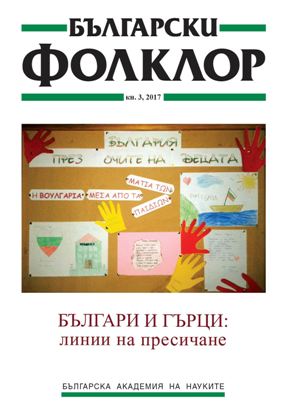Българското неделно училище „Св. Вмчк Георги Зограф“ в Солун – институция, консолидационен център, медиатор на българско културно наследство
Bulgarian Sunday School “Saint George the Zograf” in Thessaloniki – Institution, Consolidating Centre, Mediator of Bulgarian Cultural Heritage
Author(s): Tanya MatanovaSubject(s): Anthropology, Social Sciences, Education, Cultural history, Cultural Anthropology / Ethnology, Culture and social structure , School education, Migration Studies, Inter-Ethnic Relations, Ethnic Minorities Studies, Identity of Collectives
Published by: Институт за етнология и фолклористика с Етнографски музей при БАН
Keywords: Bulgarian Sunday school; migrant institutions; transmission of Bulgarian cultural heritage
Summary/Abstract: The text presents the history of the establishment and development of the Bulgarian Sunday School “Saint George the Zograph” in Thessaloniki (under the patronage of the Bulgarian Athos monastery “Saint George the Zograf”) and examines the curricular and the extra-curricular activities by means of which the Bulgarian cultural heritage is preserved and transmitted. Attention is also paid to the other Bulgarian formal and informal institutions staying in close contact with the school – for example the Consulate General of the Republic of Bulgaria in the city, the group for folk dances and music, as well as the Slavic church choir. Due to the celebration of the feasts and to the activity of the Bulgarian school, the Bulgarian community in Thessaloniki could be considered consolidated, organized and self-reproducing one while the Bulgarian Sunday school functions as a consolidating centre for it (i.e. as an institutional space which unites it and brings its members together upon their common interests as Bulgarian organizations and Bulgarian migrants). The school also functions as a mediator of the Bulgarian cultural heritage because of taking part in the events, organized by the local Greek society with performances including elements of the Bulgarian dance, music, verbal and ritual folklore.In other words, the knowledge about the Bulgarian language, religion, history, folklore and culture is reproduced and transmitted to the next generation (and to the Greek society) through the curricular and extra-curricular activities, as well as through the festive events within the Greek society and within the Bulgarian migrant community. Furthermore, this contributes to the maintenance of the Bulgarian spirit in Thessaloniki and to the preservation of the ethno-cultural identity of the Bulgarian migrants there.
Journal: Български фолклор
- Issue Year: XLIII/2017
- Issue No: 3
- Page Range: 355-371
- Page Count: 17
- Language: Bulgarian
- Content File-PDF

